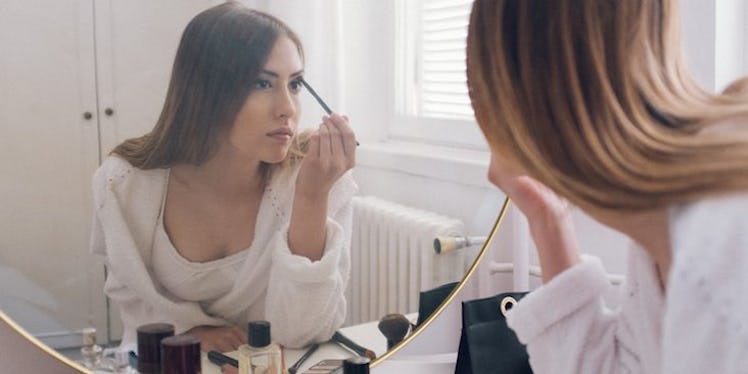
So, Can You Remember The Last Time You Actually Washed Your Makeup Brushes?
You wouldn't apply makeup with dirty fingers, would you? The same logic applies when it comes to your applicator tools -- or at least, it should. Between putting on foundation, blush, and concealer (not to mention contouring, which is a world in and of itself), most of us don't wash our makeup brushes properly or as frequently as we should. But this is a big -- and gross -- mistake.
If you wear makeup every day, makeup brushes come in direct contact with your face pretty damn often, and if you're not giving these tools at least a sudsy rinse once in a while, bacteria can build up fast.
To give you an example, Katie Wright recently experienced firsthand what can happen to literally anyone who neglects to wash their makeup brushes.
Wright had squeezed what she assumed to be just an average pimple, but instead of popping, the skin began to swell. She checked into an emergency room, where she was diagnosed with cellulitis, a severe Staph infection that attacks deep cell tissue.
Because of where the infection was located, she believes the infection was a result of bacteria on her eyebrow pencil brush.
She told Metro.co.uk,
I'm super strict on washing my face/beauty blender/brushes, but I never thought to disinfect my eyebrow spooly. If you wear makeup, PLEASE make that a step in your cleansing routine!
Although this particular situation is obviously an extreme (and rare) case, neglecting to wash your makeup brushes can definitely have a negative effect on your skin's health.
The reality is, you should be washing your makeup brushes as often as you can.
Dr. Macrene Alexiades, founder of 37 Actives Skincare, tells Elite Daily that makeup brushes should be washed anywhere from once a day to once a week minimum, especially when dealing with sensitive skin. This may sound tedious, especially when you're up against a time crunch in the morning, but your complexion's cleanliness is certainly worth taking a few extra minutes to get ready in the morning.
Elite Daily also spoke with a representative from Savor Beauty, who recommends a few different ways to scrub the dirt from you makeup brushes.
She explains,
In between each makeup application, you can spray your brushes with lavender water, which acts as a natural and gentle antiseptic, unlike alcohol spray, which is highly drying and can cause irritation. Washing your makeup brushes with warm water and a foaming soap -- such as dish soap for synthetic brushes, or shampoo for natural bristles -- will work great!
It really doesn't matter if you apply makeup every day, every other day, or only on the weekends. If a makeup brush comes in contact with product, it needs to be cleaned as soon as possible.
Otherwise, bacteria build-up is pretty much inevitable.
Irritation, dryness, oiliness, and breakouts are all potential, direct results of your skin being exposed to harmful bacteria.
The Savor Beauty representative tells Elite Daily,
Makeup brush bacteria is one of your skin's worst enemies. It will get inside your pores, creating blackheads and acne. If your skin has excess oils, the makeup residue left on dirty brushes will make your skin oilier and prone to breakouts.
That being said, blemishes should be the least of your worries. While clogged pores and acne are a concern, dirty makeup brushes can also potentially cause eye infections, sties, and cold sores, according to Dr. Alexiades.
Plus, taking care of your brushes will extend the life of the applicator tool itself.
Obviously the state of your brushes isn't nearly as important as your skin's well-being, but we pay a high price for high quality, so we might as well take care of our makeup brushes the right way.
Renowned makeup artist Ashleigh Ciucci told Allure,
Brush hairs and sponges are porous, so they hold onto oils, debris, and bacteria. If your brushes are dirty, your application will be spotty, and blending will be difficult.
Like brushing your teeth or making your bed, cleaning your makeup brushes daily is annoying, but necessary. But I promise you, your skin and your bristles will be grateful for the effort.